Critique: Dennis O'Neil's "Two Fates of Two-Face" from SUPERVILLAINS AND PHILOSOPHY
SO! In the book, Supervillains and Philosophy (2009), legendary Batman author Denny O'Neil wrote an essay/fic about Harvey Dent! Neato keen!
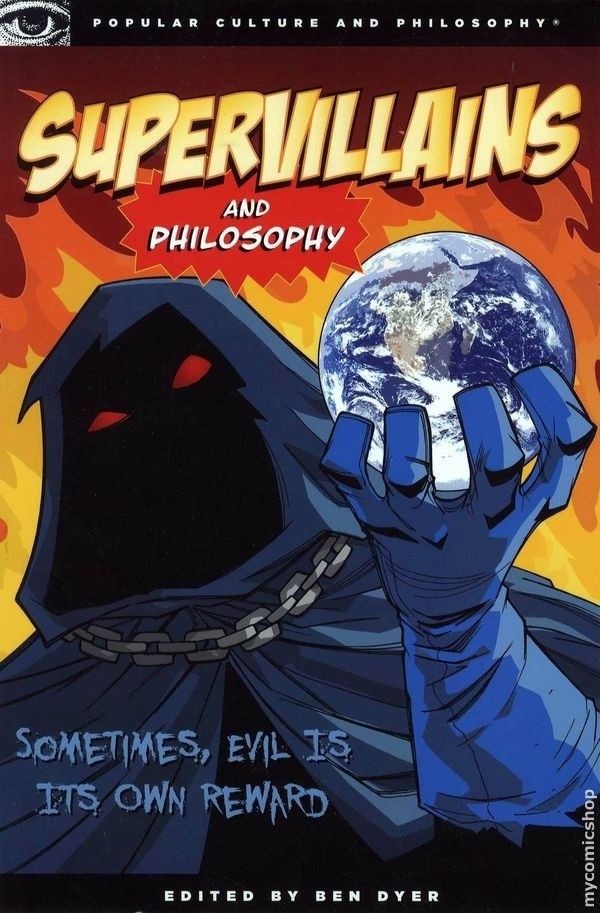
Wow, O'Neil, a philosophically-driven writer with tons of Batman experience, writing about Two-Face? Oh, oh, do tell, what's it about?! WELL, apparently, Harvey Dent was a... um... fervent Christian and Calvinist, huh, okay, who got into law for the sole purpose of punishing criminals as a... er... holy crusade against sinners... wait... and he also rejected the philosophies of existentialists and Nietzsche as "blasphemy," no, that's not... that is, until he got hit by acid, at which point he... he...
... Okay, y'know what? Let... let's just stop right there.
*presses temples, takes a deep breath*
Look. Here's the thing. I've gotten really frustrated trying to find ANYTHING related to Harvey (or, for that matter, any of the other Batman villains other than the Joker) in essay collections such as Batman and Philosophy: Dark Knight of the Soul, Batman Unmasked: Analyzing a Cultural Icon, or the O'Neil-edited Batman Unauthorized: Vigilantes, Jokers, and Heroes in Gotham City. The closest anyone's come to anything is an essay about Batman and "The Elusiveness of a Complete Friendship" in Superheroes and Philosophy: Truth, Justice, and the Socratic Way where Harvey was briefly examined in terms of his friendship with Batman. Even then, he's discussed only as an adjunct to Batman's own issues, not for his own philosophical value.
I just don't get it. I know I'm biased and all, but seriously, if you're going to talk about comics characters and philosophy, isn't Two-Face one of the most obviously rich sources of discussion material? He hits so many classic themes, from good and evil, the duality of man, fate versus chance, punishment versus rehabilitation, the responsibility (or lack thereof) of one's own actions, justice and balance... and those are just the ones that come to mind! Why is the Joker considered such a fount of philosophical debate, when Two-Face lends himself so perfectly as a humanized symbol of age-old questions?
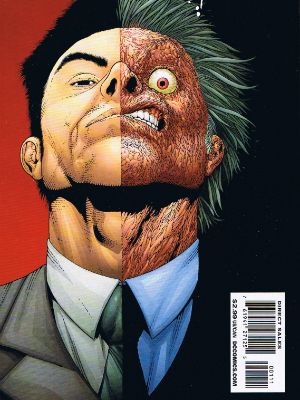
Hmmm... good and evil in one character, you say? Nope, I just don't see it.
So finally, when someone actually DOES tackle Harvey head-on, they do it by using the character as a strawman for a look at "religious fanaticism versus existentialism." These are themes which don't fit Harvey Dent. Like, at all. So to accomplish this, O'Neil crafts a whole new backstory and origin for the character, to the point that he barely resembles Harvey Dent at all. I'd expect this from a pompous philosopher who only has a passing knowledge of the characters from the films and a couple big-name comics, but this is Denny O'-fucking-Neil, a guy with over thirty years' experience as both writer and group editor of Batman comics! This is a guy who KNOWS the stories, who could have easily had something to say about them and the character as he's been presented, but instead chose to bend the character over backwards for his own ends.
I'd love to post the whole thing, just so those better versed in theology and/or philosophy could tear this apart more thoughtfully than I'm able, but the best I can do is post available snippets from the pages of Supervillains and Philosophy up at Google Books and do my best to describe the rest.
O'Neil's piece, "Two Fates for Two-Face," opens to set the scene of Gotham City, a place as timeless as Neverland or Hogwarts, as we prepare to focus on a single character:
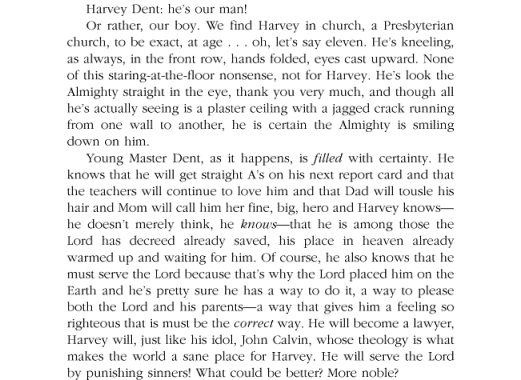
Right away, I'm thinking, "Really? We're doing this?" I mean, who doesn't see where this is going right from the start?
Okay, first of all, let's back up and ask, "In what continuity is this supposed to take place?" The idea of Harvey being a devoutly Christian child theoretically could fit any of the versions we know, depending on how his views changed the older he got. But right away, from the mentions of his happy home life with his family, it's clear that this is the Harvey of neither Eye of the Beholder, Batman: Jekyll & Hyde, Batman: The Animated Series, nor The Dark Knight. So is this meant to be classic Pre-Crisis Harvey, the one whose two-headed silver dollar was originally owned by "Boss" Maroni? Nope, not that either:

So thanks to the inclusion of "Uncle Gerald" inexplicably giving Harvey a two-headed "fifty-cent piece" (changing it from a silver dollar to a half dollar? Oh, Denny O'Neil, isn't that cute...), I think it's clear that O'Neil is either making up a whole new origin here, or doesn't remember any of the original stories. Here's the thing: a new origin isn't a bad thing in of itself. The details of an origin don't matter as much as the spirit of the character remaining intact. Which isn't the case, as we can already see. And for those who can't see that, ohhhhh don't worry, you will.
Look, Harvey has often been depicted as a guy whose ideals are either shattered by the acid attack, or eroded away shortly beforehand due to a system which he comes to view as corrupt and/or inefficient. If he's ever been a figure of devout faith, it's in the system of law and order. And even then, some stories show him being more than willing to bend the rules by, say, working with a vigilante (Batman: Year One, which was edited by O'Neil).
But in O'Neil's piece, the law is an afterthought, a means to a much higher end, thus putting Harvey on the path to become a far more literal "Crusading D.A." This extent of his fanaticism becomes apparent in the passage where Harvey runs afoul of non-theological philosophy:
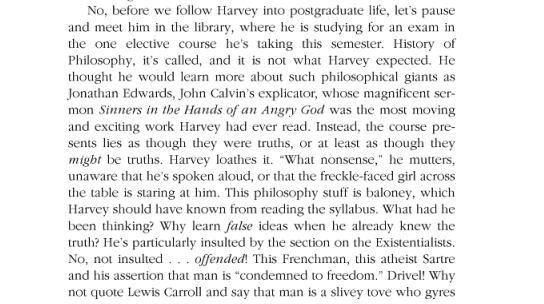
... And so on. O'Neil sets Harvey up as someone so blindly faithful, so rigidly and unyieldingly self-righteous, that he'll snap like a twig at the first sign of trauma. This has about as much dramatic tension, weight, and power as watching a domino being set up.
What's worse, Saint Harvey is a little prick. He's the kind of guy who refuses to read anything other than Scripture, because what's the point, right? The Bible has all the answers, so why bother reading any other book? And if that weren't clear enough shorthand for "closed-minded hardline Christian," O'Neil cranks it up to 11 by having Harvey argue in FAVOR of the Spanish Inquisition, saying that "Torquemada and his Dominican cohorts may have erred in certain particulars, but their cause and methods were beyond reproach." Oh, and his idol John Calvin cooperated with the Inquisition, thus further validating it in his mind.
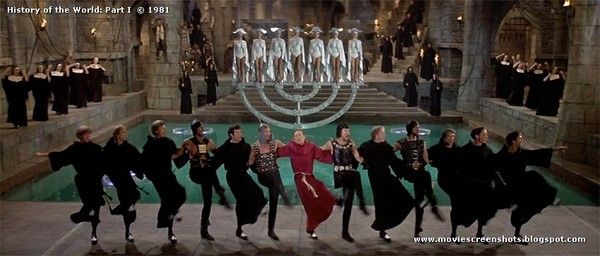
Harvey Dent APPROVED
... Wow. And we're barely on the third page of this thing! As it goes on, the little prick grows up to become a massive dickwad, thus erasing any sense of tragedy for what's about to happen.
While his professors want to "flunk that little bastard Dent," Harvey flies through school with a perfect record (save for the sole blemish of an "Incomplete" in philosophy), getting offers from law firms from across the globe, as well as other proposals based on his good looks. And Harvey knows that he's handsome, oh yes. He even keeps a full-length mirror by his bedside so that he can admire himself, as you see, "he is convinced that his body is the mirror of his soul. If his body is this beautiful, surely his soul must rival the angels themselves."
So not only is Harvey a fanatic, he's also a narcissist who sees his own handsomeness that is literally divine. Not to be ironic, but Jesus Christ.
This isn't just out of character*. This is so divorced from anything that the average person could relate to that it negates any worth that Harvey has as a philosophical symbol for the human condition, which is what he SHOULD be. At the very most superficial level, Two-Face is an explicit symbol for the duality in EVERY person. By changing Harvey's fundamental personality and background in such a manner, O'Neil has completely removed the character from anything close to universality. While there are certainly people like this in real life, it's pushed to such an extreme degree that Harvey is at best a naive, self-absorbed dickhole, or at worst, a cartoon:
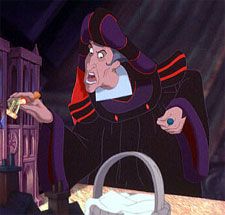
Pictured: what O'Neil's Harvey Dent would have grown up to become if he hadn't been hit by acid
I think the worst part of all this isn't that Harvey is a devout Christian, because there are devout Christians who are also legitimately good people. There damn well aren't enough to counteract the assholes, but they exist. My grandfather was one such person, the kind of man who never went around declaring his faith but rather lived it quietly and humbly by doing things like weekly volunteering at a DC-area soup kitchen. If Harvey were the kind of Christian who did good works (either as a D.A. or elsewhere), there'd still be the potential for poignancy and tragedy after it all comes undone.
Instead, Harvey continues his Frollo-ification by reveling in the act of prosecution, that he "especially enjoys the expression on the perps' faces when they realize that he has them, they are trapped, they are doomed, there is nothing they or their lawyers can do to save them. Jonathan Edwards put what Harvey feels best when he wrote of sinners that 'hell is gaping for them, the flames father and flash about them and would fain lay hold on them...' Yes, yes--the fate of those who have not the Lord's favor, the lost, the doomed. He thought of the evildoers languishing in prison, a foretaste of the hell that awaited them after death... He is doing the Lord's work and the Lord is rewarding him with fame and honor upon honor."
Not only is going after criminals with vindictive satisfaction, but he's motived less by anything truly noble and more by glory on both Earth and in Heaven. This is by far the most egregious take on the "vanity" of Harvey Dent, making even Harvey Apollo look humble by comparison. It only serves to make him more of a worthless shit when the acid hits and we get the inevitable "Why me? Whhhhyyyyyyy?! But I did everything right! WHAR WERT THOU O GAWD?! RAAR I R CRAZY ATHEIST NOW!"
And if you didn't see that's where this story was going from the very start, then man, I just don't know.
Now, it's not quite as simple as that. Besides the pain of the acid, the first real shock to Harvey's worldview comes from none other than Harvey Bullock, who inadvertently plays the Joker role (although not in a nurse's outfit. I think. I hope.) of showing Dent how the universe is ruled by happenstance and heedless luck. What, you may ask, oh WHAT does Bullock have to say that so shatters Dent's perceptions? I need to transcribe the whole thing verbatim, including spelling and grammar, as Bullock explains just why "nothing could have been done to prevent Maroni's attack":
"The cop who woulda patted Maroni down was late counta he forgot his gun and had to run back home to get it and then he was caught in traffic counta a steam pipe bursting and when he finally gets to the courthouse the trial's already late getting started and he just rushes Maroni in, ya can't blame him, and anyway the acid wasn't originally intended for you, Maroni was gonna use it on an ex-girlfriend only she was struck by lightning in the park and near as we can tell Maroni forgot he even had it in his pocket...
Y'know, I was ready to allow the ridiculous idea that there apparently is only one designated "patter-downer" cop in the entire Gotham courthouse on the day of a huge mob trial. Hell, I was even going to forgive the idea that Bullock would be all, "Yeah, the guy did a shitty job and completely jeopardized your life, cut him some slack." Hell, I was even going to allow the whole "the acid wasn't originally intended for you!" twist because that fits the Bronze Age origin of Two-Face.
But the "girlfriend struck by lightning" broke my brain. Once you throw in random freak lightning in an already-rambling series of horrible coincidences, that's less an argument for "there is no God, the universe is random" and more for "There IS a God, but He's just fucking with you."
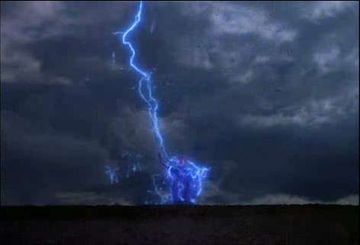
So after the bandages come off, a disillusioned Harvey heads home (and in case it wasn't clear, there's no Gilda in this story either, probably since no Gilda would ever put up with an ass like Saint Harvey), covers up all the mirrors, and discovers that Uncle Gerald's coin in his pocket was scarred by acid, ala Eye of the Beholder. And suddenly, Harvey is filled with DOUBT for the first time in his life. Horrible, horrible doubt! Oh, the doubtingness of it all, the first sin, the WORST sin! He didn't heed God's warning not to eat the metaphorical apple or some shit, doubt doubt sin DOUBT!
In desperation for answers, Harvey digs out the old philosophy textbook, devours it in one sitting (OM NOM NOM THOUGHTS) then head to the library to read about--gasp shock horror--science. He reads about Einstein, who said "God does not play dice with the universe," but whose own studies showed that, on sub-atomic levels, "much of reality is random." This blows Harvey's fragile little miiiind.
But at least it can't get any worse, can it? *reads next line* D'OH!
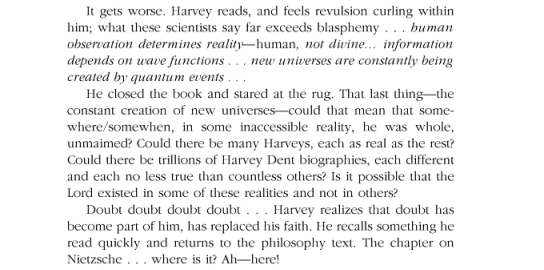
Now, I'm wondering if the "trillions of Harvey Dent biographies, each different and each no less true than countless others" is meant to be O'Neil winking to the knowledgeable obsessive like myself, a sort of "Yeah, I know I'm making all this up without any basis in canon, but isn't it just as true when you get right down to it?" If that's what he's asking, then I'm afraid the answer I've proven throughout this post is "no, no it bloody well isn't."
Also, bad enough that Harvey is a caricature of a religious fanatic, but the true turning point in his philosophy comes from frickin' Nietzsche? You know, the go-to philosopher for characters to love if you want them to be seen as self-serving, self-justifying assholes?
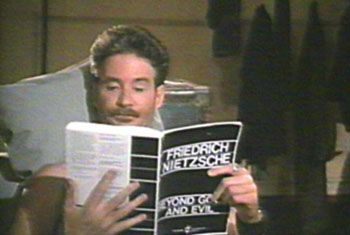
Bad enough that Nietzsche gets a bad rep for supposedly inspiring Hitler (from what I understand, you can blame Nietzsche's sister for distorting her brother's works into something palatable for the Nazis), but he deserves better than becoming a cliched trope for being second only to Ayn Rand when it comes to inspiring bastards to be assholes.
But okay, okay, let's see the big Nietzsche quote, and how it changes Harvey forever:
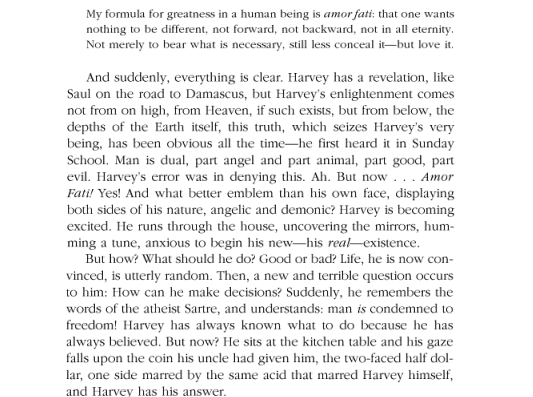
And so he flips the coin, considering how in another universe, the coin may have landed good side up, and Harvey would have secluded himself in a windowless office at a law firm. Or perhaps, in another universe, a bird flew in and snatched the coin midair (which I suppose he'd take as an omen, and now we know the origin of Harvey Birdman!), and so on.
But in THIS universe, O'Neil simply concludes, as if writing Harvey Dent as some kind of philosophy-loving Rat-Packer: "Amor fati, baby."
Sigh.
I'm trying to figure out what O'Neil was trying to go for here. I suspect that the germ of the idea was applying Two-Face to that Nietzsche quote in some way that he'd be receptive to embracing "Amor fati" as a mission statement. It's not a bad idea, but I'm not certain that O'Neil had to completely re-imagine the character to get there. In doing so, O'Neil sabotaged any chances of us seeing Harvey as being "half good" at all, since his supposed piety was more based in pride and, well, prejudice.
Now, there's another possibility, one which I doubt O'Neil ever intended: the religious crusader side of Harvey, the judgmental prick who was all "yay Inquisition!" WAS the "demonic" side of his nature. Not to go all Richard Dawkins on anyone, especially since I'm more of a hopeful agnostic (which you can take however you like) than atheist, but what if the "good" side of Harvey is the one that was born out of the pain and disillusionment, building himself up from the ashes and opening up his mind to concepts of philosophy and science? Now that would have been different, interesting... aaaaaand still in no way resembles any Harvey Dent we have ever seen.
So what's the point in using him at all if you're going to discard virtually everything that makes the character tick? That's what frustrates me more than anything else. If O'Neil really wanted to come to that point by tearing down a fervently pious character, I would rather he used his own original Bloodlines villain, Cardinal Sin, who fit these themes far more than Two-Face ever has. But then, nobody cares about Cardinal Sin, presumably not even O'Neil himself, since the character never appeared more than once.
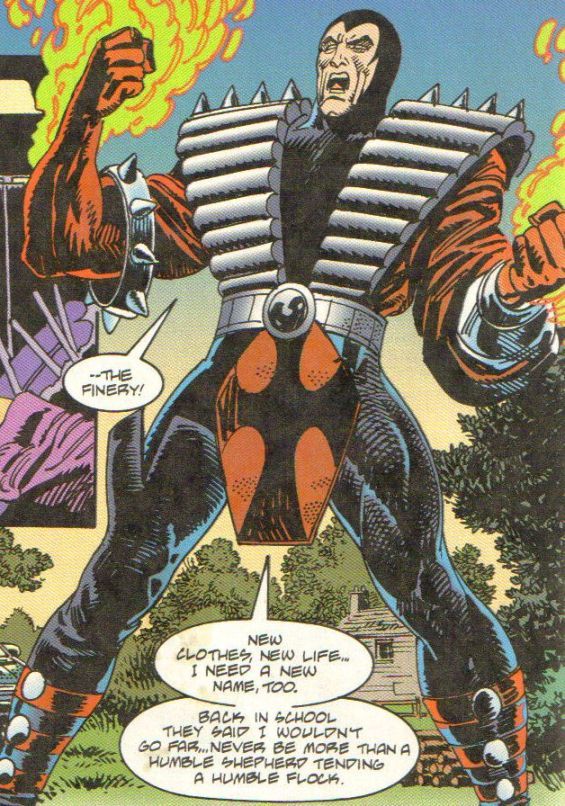
O Creator, why has thou forsaken me and my spiked shoulder pads of evil?!
Thing is, O'Neil has repeatedly displayed a fascination for Eastern philosophy in comics like The Question, and considering how many times creators have tried slapping a yin-yang symbol on Two-Face, it makes me wonder why he hell O'Neil didn't try being the first to tackle Taoist themes in the character. It just seems like such an obvious fit in retrospect. Man, now I'm imagining a whole story with the Question (Charlie/Vic) raising all manner of philosophical themes to Harvey, as well as challenge the preconceived notions of Two-Face to other characters such as Batman, Gordon, Dick, and Renee. The Faceless Man exploring the philosophies surrounding the man with Two Faces: why the hell hasn't O'Neil written this, like, yesterday?
A good question, I suppose. And one of many that will go unasked until somebody finally explores the vast thematic, literary, and philosophical potential that Harvey Dent potentially represents. Well... somebody other than me, at any rate.
*ETA: Regardless of what some fans or Batman: Face the Face would have you believe, it's never been canon that Harvey Dent was in any way a vain person before or after the acid attack. That's a whole other rant I need to explore in the near future.

Wow, O'Neil, a philosophically-driven writer with tons of Batman experience, writing about Two-Face? Oh, oh, do tell, what's it about?! WELL, apparently, Harvey Dent was a... um... fervent Christian and Calvinist, huh, okay, who got into law for the sole purpose of punishing criminals as a... er... holy crusade against sinners... wait... and he also rejected the philosophies of existentialists and Nietzsche as "blasphemy," no, that's not... that is, until he got hit by acid, at which point he... he...
... Okay, y'know what? Let... let's just stop right there.
*presses temples, takes a deep breath*
Look. Here's the thing. I've gotten really frustrated trying to find ANYTHING related to Harvey (or, for that matter, any of the other Batman villains other than the Joker) in essay collections such as Batman and Philosophy: Dark Knight of the Soul, Batman Unmasked: Analyzing a Cultural Icon, or the O'Neil-edited Batman Unauthorized: Vigilantes, Jokers, and Heroes in Gotham City. The closest anyone's come to anything is an essay about Batman and "The Elusiveness of a Complete Friendship" in Superheroes and Philosophy: Truth, Justice, and the Socratic Way where Harvey was briefly examined in terms of his friendship with Batman. Even then, he's discussed only as an adjunct to Batman's own issues, not for his own philosophical value.
I just don't get it. I know I'm biased and all, but seriously, if you're going to talk about comics characters and philosophy, isn't Two-Face one of the most obviously rich sources of discussion material? He hits so many classic themes, from good and evil, the duality of man, fate versus chance, punishment versus rehabilitation, the responsibility (or lack thereof) of one's own actions, justice and balance... and those are just the ones that come to mind! Why is the Joker considered such a fount of philosophical debate, when Two-Face lends himself so perfectly as a humanized symbol of age-old questions?

Hmmm... good and evil in one character, you say? Nope, I just don't see it.
So finally, when someone actually DOES tackle Harvey head-on, they do it by using the character as a strawman for a look at "religious fanaticism versus existentialism." These are themes which don't fit Harvey Dent. Like, at all. So to accomplish this, O'Neil crafts a whole new backstory and origin for the character, to the point that he barely resembles Harvey Dent at all. I'd expect this from a pompous philosopher who only has a passing knowledge of the characters from the films and a couple big-name comics, but this is Denny O'-fucking-Neil, a guy with over thirty years' experience as both writer and group editor of Batman comics! This is a guy who KNOWS the stories, who could have easily had something to say about them and the character as he's been presented, but instead chose to bend the character over backwards for his own ends.
I'd love to post the whole thing, just so those better versed in theology and/or philosophy could tear this apart more thoughtfully than I'm able, but the best I can do is post available snippets from the pages of Supervillains and Philosophy up at Google Books and do my best to describe the rest.
O'Neil's piece, "Two Fates for Two-Face," opens to set the scene of Gotham City, a place as timeless as Neverland or Hogwarts, as we prepare to focus on a single character:

Right away, I'm thinking, "Really? We're doing this?" I mean, who doesn't see where this is going right from the start?
Okay, first of all, let's back up and ask, "In what continuity is this supposed to take place?" The idea of Harvey being a devoutly Christian child theoretically could fit any of the versions we know, depending on how his views changed the older he got. But right away, from the mentions of his happy home life with his family, it's clear that this is the Harvey of neither Eye of the Beholder, Batman: Jekyll & Hyde, Batman: The Animated Series, nor The Dark Knight. So is this meant to be classic Pre-Crisis Harvey, the one whose two-headed silver dollar was originally owned by "Boss" Maroni? Nope, not that either:

So thanks to the inclusion of "Uncle Gerald" inexplicably giving Harvey a two-headed "fifty-cent piece" (changing it from a silver dollar to a half dollar? Oh, Denny O'Neil, isn't that cute...), I think it's clear that O'Neil is either making up a whole new origin here, or doesn't remember any of the original stories. Here's the thing: a new origin isn't a bad thing in of itself. The details of an origin don't matter as much as the spirit of the character remaining intact. Which isn't the case, as we can already see. And for those who can't see that, ohhhhh don't worry, you will.
Look, Harvey has often been depicted as a guy whose ideals are either shattered by the acid attack, or eroded away shortly beforehand due to a system which he comes to view as corrupt and/or inefficient. If he's ever been a figure of devout faith, it's in the system of law and order. And even then, some stories show him being more than willing to bend the rules by, say, working with a vigilante (Batman: Year One, which was edited by O'Neil).
But in O'Neil's piece, the law is an afterthought, a means to a much higher end, thus putting Harvey on the path to become a far more literal "Crusading D.A." This extent of his fanaticism becomes apparent in the passage where Harvey runs afoul of non-theological philosophy:

... And so on. O'Neil sets Harvey up as someone so blindly faithful, so rigidly and unyieldingly self-righteous, that he'll snap like a twig at the first sign of trauma. This has about as much dramatic tension, weight, and power as watching a domino being set up.
What's worse, Saint Harvey is a little prick. He's the kind of guy who refuses to read anything other than Scripture, because what's the point, right? The Bible has all the answers, so why bother reading any other book? And if that weren't clear enough shorthand for "closed-minded hardline Christian," O'Neil cranks it up to 11 by having Harvey argue in FAVOR of the Spanish Inquisition, saying that "Torquemada and his Dominican cohorts may have erred in certain particulars, but their cause and methods were beyond reproach." Oh, and his idol John Calvin cooperated with the Inquisition, thus further validating it in his mind.

Harvey Dent APPROVED
... Wow. And we're barely on the third page of this thing! As it goes on, the little prick grows up to become a massive dickwad, thus erasing any sense of tragedy for what's about to happen.
While his professors want to "flunk that little bastard Dent," Harvey flies through school with a perfect record (save for the sole blemish of an "Incomplete" in philosophy), getting offers from law firms from across the globe, as well as other proposals based on his good looks. And Harvey knows that he's handsome, oh yes. He even keeps a full-length mirror by his bedside so that he can admire himself, as you see, "he is convinced that his body is the mirror of his soul. If his body is this beautiful, surely his soul must rival the angels themselves."
So not only is Harvey a fanatic, he's also a narcissist who sees his own handsomeness that is literally divine. Not to be ironic, but Jesus Christ.
This isn't just out of character*. This is so divorced from anything that the average person could relate to that it negates any worth that Harvey has as a philosophical symbol for the human condition, which is what he SHOULD be. At the very most superficial level, Two-Face is an explicit symbol for the duality in EVERY person. By changing Harvey's fundamental personality and background in such a manner, O'Neil has completely removed the character from anything close to universality. While there are certainly people like this in real life, it's pushed to such an extreme degree that Harvey is at best a naive, self-absorbed dickhole, or at worst, a cartoon:

Pictured: what O'Neil's Harvey Dent would have grown up to become if he hadn't been hit by acid
I think the worst part of all this isn't that Harvey is a devout Christian, because there are devout Christians who are also legitimately good people. There damn well aren't enough to counteract the assholes, but they exist. My grandfather was one such person, the kind of man who never went around declaring his faith but rather lived it quietly and humbly by doing things like weekly volunteering at a DC-area soup kitchen. If Harvey were the kind of Christian who did good works (either as a D.A. or elsewhere), there'd still be the potential for poignancy and tragedy after it all comes undone.
Instead, Harvey continues his Frollo-ification by reveling in the act of prosecution, that he "especially enjoys the expression on the perps' faces when they realize that he has them, they are trapped, they are doomed, there is nothing they or their lawyers can do to save them. Jonathan Edwards put what Harvey feels best when he wrote of sinners that 'hell is gaping for them, the flames father and flash about them and would fain lay hold on them...' Yes, yes--the fate of those who have not the Lord's favor, the lost, the doomed. He thought of the evildoers languishing in prison, a foretaste of the hell that awaited them after death... He is doing the Lord's work and the Lord is rewarding him with fame and honor upon honor."
Not only is going after criminals with vindictive satisfaction, but he's motived less by anything truly noble and more by glory on both Earth and in Heaven. This is by far the most egregious take on the "vanity" of Harvey Dent, making even Harvey Apollo look humble by comparison. It only serves to make him more of a worthless shit when the acid hits and we get the inevitable "Why me? Whhhhyyyyyyy?! But I did everything right! WHAR WERT THOU O GAWD?! RAAR I R CRAZY ATHEIST NOW!"
And if you didn't see that's where this story was going from the very start, then man, I just don't know.
Now, it's not quite as simple as that. Besides the pain of the acid, the first real shock to Harvey's worldview comes from none other than Harvey Bullock, who inadvertently plays the Joker role (although not in a nurse's outfit. I think. I hope.) of showing Dent how the universe is ruled by happenstance and heedless luck. What, you may ask, oh WHAT does Bullock have to say that so shatters Dent's perceptions? I need to transcribe the whole thing verbatim, including spelling and grammar, as Bullock explains just why "nothing could have been done to prevent Maroni's attack":
"The cop who woulda patted Maroni down was late counta he forgot his gun and had to run back home to get it and then he was caught in traffic counta a steam pipe bursting and when he finally gets to the courthouse the trial's already late getting started and he just rushes Maroni in, ya can't blame him, and anyway the acid wasn't originally intended for you, Maroni was gonna use it on an ex-girlfriend only she was struck by lightning in the park and near as we can tell Maroni forgot he even had it in his pocket...
Y'know, I was ready to allow the ridiculous idea that there apparently is only one designated "patter-downer" cop in the entire Gotham courthouse on the day of a huge mob trial. Hell, I was even going to forgive the idea that Bullock would be all, "Yeah, the guy did a shitty job and completely jeopardized your life, cut him some slack." Hell, I was even going to allow the whole "the acid wasn't originally intended for you!" twist because that fits the Bronze Age origin of Two-Face.
But the "girlfriend struck by lightning" broke my brain. Once you throw in random freak lightning in an already-rambling series of horrible coincidences, that's less an argument for "there is no God, the universe is random" and more for "There IS a God, but He's just fucking with you."

So after the bandages come off, a disillusioned Harvey heads home (and in case it wasn't clear, there's no Gilda in this story either, probably since no Gilda would ever put up with an ass like Saint Harvey), covers up all the mirrors, and discovers that Uncle Gerald's coin in his pocket was scarred by acid, ala Eye of the Beholder. And suddenly, Harvey is filled with DOUBT for the first time in his life. Horrible, horrible doubt! Oh, the doubtingness of it all, the first sin, the WORST sin! He didn't heed God's warning not to eat the metaphorical apple or some shit, doubt doubt sin DOUBT!
In desperation for answers, Harvey digs out the old philosophy textbook, devours it in one sitting (OM NOM NOM THOUGHTS) then head to the library to read about--gasp shock horror--science. He reads about Einstein, who said "God does not play dice with the universe," but whose own studies showed that, on sub-atomic levels, "much of reality is random." This blows Harvey's fragile little miiiind.
But at least it can't get any worse, can it? *reads next line* D'OH!

Now, I'm wondering if the "trillions of Harvey Dent biographies, each different and each no less true than countless others" is meant to be O'Neil winking to the knowledgeable obsessive like myself, a sort of "Yeah, I know I'm making all this up without any basis in canon, but isn't it just as true when you get right down to it?" If that's what he's asking, then I'm afraid the answer I've proven throughout this post is "no, no it bloody well isn't."
Also, bad enough that Harvey is a caricature of a religious fanatic, but the true turning point in his philosophy comes from frickin' Nietzsche? You know, the go-to philosopher for characters to love if you want them to be seen as self-serving, self-justifying assholes?

Bad enough that Nietzsche gets a bad rep for supposedly inspiring Hitler (from what I understand, you can blame Nietzsche's sister for distorting her brother's works into something palatable for the Nazis), but he deserves better than becoming a cliched trope for being second only to Ayn Rand when it comes to inspiring bastards to be assholes.
But okay, okay, let's see the big Nietzsche quote, and how it changes Harvey forever:

And so he flips the coin, considering how in another universe, the coin may have landed good side up, and Harvey would have secluded himself in a windowless office at a law firm. Or perhaps, in another universe, a bird flew in and snatched the coin midair (which I suppose he'd take as an omen, and now we know the origin of Harvey Birdman!), and so on.
But in THIS universe, O'Neil simply concludes, as if writing Harvey Dent as some kind of philosophy-loving Rat-Packer: "Amor fati, baby."
Sigh.
I'm trying to figure out what O'Neil was trying to go for here. I suspect that the germ of the idea was applying Two-Face to that Nietzsche quote in some way that he'd be receptive to embracing "Amor fati" as a mission statement. It's not a bad idea, but I'm not certain that O'Neil had to completely re-imagine the character to get there. In doing so, O'Neil sabotaged any chances of us seeing Harvey as being "half good" at all, since his supposed piety was more based in pride and, well, prejudice.
Now, there's another possibility, one which I doubt O'Neil ever intended: the religious crusader side of Harvey, the judgmental prick who was all "yay Inquisition!" WAS the "demonic" side of his nature. Not to go all Richard Dawkins on anyone, especially since I'm more of a hopeful agnostic (which you can take however you like) than atheist, but what if the "good" side of Harvey is the one that was born out of the pain and disillusionment, building himself up from the ashes and opening up his mind to concepts of philosophy and science? Now that would have been different, interesting... aaaaaand still in no way resembles any Harvey Dent we have ever seen.
So what's the point in using him at all if you're going to discard virtually everything that makes the character tick? That's what frustrates me more than anything else. If O'Neil really wanted to come to that point by tearing down a fervently pious character, I would rather he used his own original Bloodlines villain, Cardinal Sin, who fit these themes far more than Two-Face ever has. But then, nobody cares about Cardinal Sin, presumably not even O'Neil himself, since the character never appeared more than once.

O Creator, why has thou forsaken me and my spiked shoulder pads of evil?!
Thing is, O'Neil has repeatedly displayed a fascination for Eastern philosophy in comics like The Question, and considering how many times creators have tried slapping a yin-yang symbol on Two-Face, it makes me wonder why he hell O'Neil didn't try being the first to tackle Taoist themes in the character. It just seems like such an obvious fit in retrospect. Man, now I'm imagining a whole story with the Question (Charlie/Vic) raising all manner of philosophical themes to Harvey, as well as challenge the preconceived notions of Two-Face to other characters such as Batman, Gordon, Dick, and Renee. The Faceless Man exploring the philosophies surrounding the man with Two Faces: why the hell hasn't O'Neil written this, like, yesterday?
A good question, I suppose. And one of many that will go unasked until somebody finally explores the vast thematic, literary, and philosophical potential that Harvey Dent potentially represents. Well... somebody other than me, at any rate.
*ETA: Regardless of what some fans or Batman: Face the Face would have you believe, it's never been canon that Harvey Dent was in any way a vain person before or after the acid attack. That's a whole other rant I need to explore in the near future.